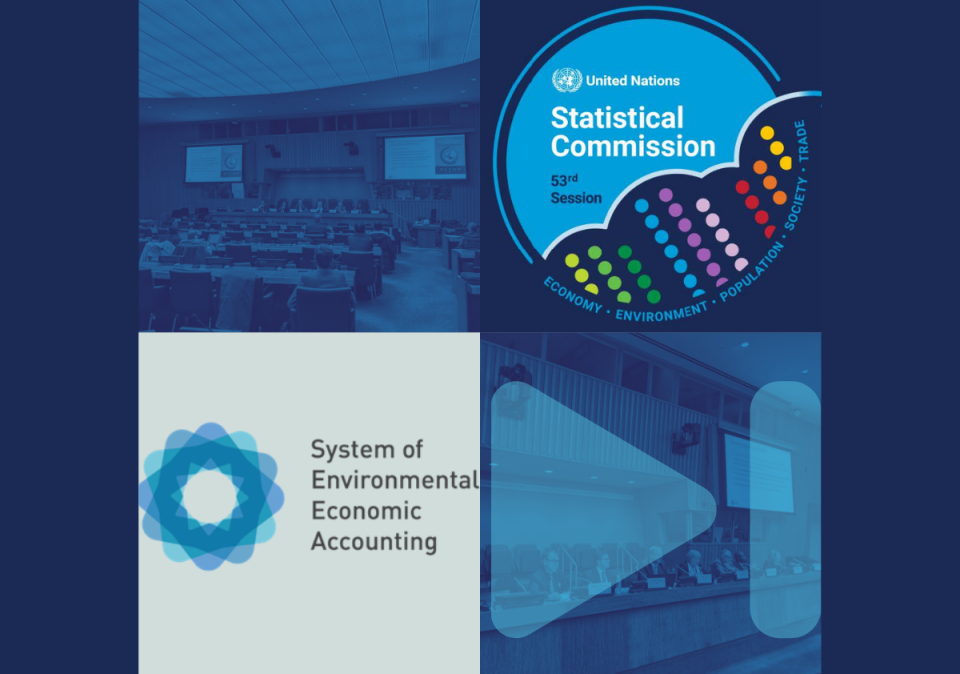Looking forward to the 53rd UN Statistical Commission

Early next year, the 53rd UN Statistical Commission will take place from 1-4 March 2022. The annual Commission provides an opportunity for the UN Committee of Experts on Environmental-Economic Accounting (UNCEEA) to inform the wider statistical community of the progress it has made over the past year and what lies ahead. In particular, with the landmark adoption of the SEEA Ecosystem Accounting this year, the Committee has proposed a new programme of work for 2022 to 2025.
Unsurprisingly, one of the biggest shifts in focus is for the work programme of Area B2 on SEEA Ecosystem Accounting (SEEA EA). With the white-cover version of the SEEA EA released in October, the focus has turned to implementation. The Technical Committee on the SEEA EA has developed an implementation strategy (to be posted soon as a background document) that involves building capacity in countries and developing materials to support implementation. Area D on capacity building will also play a crucial role in supporting the implementation strategy, including by developing a global fundraising plan, continued advocacy and engagement, and advancement and training on global and regional tools aimed at supporting SEEA implementation.
Area A on Coordination and Communication will continue to play a vital role in mainstreaming the use of the SEEA for emerging policy issues. Biodiversity, climate change, circular economy, ocean, sustainability of tourism and sustainable finance have all been identified by Area A as areas where the accounts can provide valuable insights. Two areas in particular, biodiversity and climate change, deserve special mention. The fifteenth Conference of Parties to the Convention on Biological Diversity (CBD) is scheduled to take place in 2022 and expected to adopt the post-2020 global biodiversity framework and its monitoring framework. The monitoring framework will be an important opportunity to mainstream the SEEA, and the SEEA has been recognized as an important statistical framework in support of the monitoring framework and the indicators therein.
For climate change, the Committee is expected to engage in a proposed new G20 Data Gaps Initiative (to be presented to the G20 Finance Ministers and Central Bank Governors in early 2022). Key proposals for the Data Gaps Initiative include addressing G20 data gaps related to air emissions, energy, government subsidies, and national climate mitigation and adaptation expenditures. The Committee will be involved in assisting G20 countries in progressing towards closing these gaps. This work would be coordinated by Area A and supported both by Area B1 (SEEA CF Technical Committee) as well as Area C on global databases. In particular, Area C is currently creating air emission and energy data collection templates (as well as material flow data collection templates), which will help make progress on the G20 Data Gaps Initiative as well as global data collection and dissemination more broadly.
The Committee also plans to reinvigorate the work of the Technical Committee on the SEEA CF. The Technical Committee has prioritized three work streams, taking into account the international statistical agenda: 1) issues linked to classifications, particularly those currently being updated (e.g. ISIC, CPC); 2) supporting the 2008 SNA update on issues related to the SEEA; and 3) other issues on the research agenda, including the link between the SEEA CF and SEEA EA. To make progress in the workstreams on classifications and the SNA update, the Technical Committee is collaborating closely with the relevant expert groups and task teams.
In addition, the working group on business accounting (Area E) is moving forward with its roadmap towards alignment between the SEEA and private sector natural capital accounting. The working group will broadly focus on three objectives: 1) building bridges between private sector methodology and standards with the SEEA; 2) increased collaboration and awareness raising between statistical and business communities; and 3) greater exchange and use of high quality, interoperable data between business and national statistical offices. A detailed programme of work will be finalized soon.
Visit the website of the 53rd session of the UN Statistical Commission here: https://unstats.un.org/unsd/statcom/53rd-session/
An English draft of the UNCEEA report (subject to editing) can be found here: https://unstats.un.org/unsd/statcom/53rd-session/documents/2022-16-UNCEEA-EE.pdf
